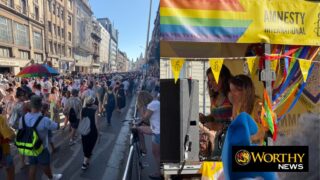Listeners:
Top listeners:
-
 play_arrow
play_arrow
Budapest Police ‘Won’t Prosecute’ Pride Participants Despite Ban


By Stefan J. Bos, Worthy News Europe Bureau Chief reporting from Budapest, Hungary
BUDAPEST (Worthy News) – Budapest police said Monday they won’t prosecute participants in the recent Budapest Pride march, which the government had banned.
The June 28 rally was the largest Pride event in Hungary’s history, with some 200,000 people marching through the Hungarian capital.
In a statement obtained by Worthy News, the Budapest Police Headquarters (BRFK) suggested that participants were likely not aware that the Budapest Pride was illegal due to “contradictory” statements by organizers, including the Municipality of Budapest.
However, under new legislation condemned by European Union leaders, participants could have faced fines of 200,000 Hungarian forints (nearly $600).
Hungarian Prime Minister Viktor Orbán’s government introduced a law banning public “propaganda” of LGBTQ+ issues to children.
Under the “child protection” legislation, the Budapest Pride was seen as illegal because it could potentially be seen by minors.
Among those marching were numerous European politicians and leaders, including Amsterdam Mayor Femke Halsema.
NO DIPLOMATIC PASSPORT
She told Worthy News then that she could be prosecuted “as I don’t have a diplomatic passport.” “However, I followed the recommendations by the Dutch embassy, and they said it is safe to participate in the Budapest Pride.”
The BRFK said that despite the ban, “on June 16, 2025, a private individual submitted a notification to hold a march in Budapest on June 28, 2025. “
It referred to the Budapest liberal-green Mayor Gergely Karacsony, a close friend of Halsema, who announced he would organize the Budapest Pride as “a municipality event” to avoid prosecution.
However, “the event, named ‘Budapest Pride’ and organized by the Municipality of Budapest, was prohibited by the Budapest Police Headquarters in a formal decision,” the BRFK stressed.
“It was reasonably assumed to be aimed at holding a gathering that was banned under the Assembly Act,” the BRFK explained.
“In accordance with the law, the police sent the decision to the organizers, who were thus informed that holding the gathering would be illegal. Since the organizers did not challenge the decision in court, it became final.”
Yet, the “organizers did not initiate consultations with the authorities and – despite being aware of the ban – communicated the opposite [to the public]”, the BRFK wrote.
MUNICIPALITY CAUSING UNCERTAINTY
“They invited people to the event and claimed it was not illegal. These contradictory statements, along with the involvement of the local government, may have caused uncertainty among many about the legal interpretation, possibly leading them to believe they were participating in the event by the applicable rules.”
Therefore, “In light of the above, the police will not prosecute the participants,” the BRFK explained. Lawyers also questioned the legal ramifications, while rights activists warned it could harm the reputation of police, who some praised for their conduct during the Budapest Pride.
It was unclear whether Mayor Karácsony and other Pride organizers would still be prosecuted as they could face up to one year imprisonment.
Yet Karácsony said he was pleased participants would not be fined. While he questioned the reasoning behind the move, “the [police] decision can be accepted,” he said.
“According to the police, I misled people who were unsure of what event they attended, so proceedings will not be filed against the participants. I think everyone knew very well why and where they were going: To a legitimate local government event to stand up for their own and others’ freedom.”
However, “Only the freedom experience remains; it can’t be taken away from anyone,” the mayor stressed.
The news was expected to be welcomed by marchers and journalists who could have been fined as cameras with face recognition technology monitored them.
ANTI-GOVERNMENT BAN
Despite the ban, Budapest Pride became the most significant anti-government protest since Orbán returned to power in 2010.
Orbán, seen as increasingly authoritarian by opposition and EU leaders, is facing a tough challenge in the 2026 elections.
His ruling Fidesz party is behind the new opposition Tisza party. Named after Hungary’s second-largest river, Tisza is led by Péter Magyar, an ex-Fidesz insider.
Orbán is a close ally and friend of U.S. President Donald J. Trump, who shares his LGBTQ+ views. The Hungarian leader, a self-declared Christian, says he wants to protect traditional family values.
Hungary’s constitution, amended under Orbán’s rule, mandates that all Hungarians be either male or female.
The constitution, known as the Fundamental Law, also describes marriage “as the association between a man and a woman.”
Additionally, it says that the “foundation of the family is marriage and the parent-child relationship,” adding that “the mother is a woman, the father is a man.”
Copyright 1999-2025 Worthy News. This article was originally published on Worthy News and was reproduced with permission.
Latest News from Worthy News
Israeli Prime Minister Benjamin Netanyahu praised his partnership with U.S. President Donald Trump as the two leaders met for a high-stakes dinner at the White House, marking a pivotal moment in U.S.-Israel cooperation following coordinated strikes on Iran and a renewed push for a Gaza cease-fire.
Budapest police said Monday they won’t prosecute participants in the recent Budapest Pride march, which the government had banned.
The Trump administration’s Department of Justice and FBI have officially concluded there is no evidence that convicted sex offender Jeffrey Epstein was murdered, blackmailed powerful elites, or kept a hidden “client list,” according to a two-page memo obtained by Axios. The findings, based on a years-long federal investigation, aim to silence long-standing conspiracy theories surrounding Epstein’s 2019 death in federal custody.
In a pivotal development for the region, Lebanon’s new leadership has submitted a detailed response to a U.S. proposal aimed at disarming Hezbollah and de-escalating hostilities with Israel. The plan, delivered last month by U.S. special envoy Thomas Barrack, outlines a four-month timeline for Hezbollah’s full disarmament in exchange for an Israeli withdrawal from southern Lebanon and a cessation of airstrikes.
The BRICS bloc of emerging economies issued a pointed yet cautious declaration Sunday condemning rising global tariffs and foreign attacks on Iran, while notably avoiding any direct criticism of U.S. President Donald Trump—despite his announcement of an additional 10% tariff on nations aligning with what he termed “Anti-American policies of BRICS.”
President Donald Trump is entering a decisive week in his global trade push, aiming to finalize several long-delayed deals before a major round of tariffs hits dozens of U.S. trading partners. With a 90-day pause on his reciprocal tariff policy set to expire July 9, Trump has vowed to escalate pressure on foreign governments — not just with levies, but with a wave of formal notices set to begin Monday.
Iran’s Supreme Leader Ayatollah Ali Khamenei made his first public appearance Saturday since the outbreak of the 12-day war between Iran and Israel, emerging during a somber Ashura ceremony in Tehran after weeks of seclusion that raised questions about his health and security.

WHO WE ARE
The Psalms, hymns, and spiritual songs encapsulate the beauty, wisdom, and eternal truths found in the Bible, creating an immersive experience that resonates with believers and seekers alike.
CONTACT
- +1 908 280-4246
- Essex County, USA
- info@tnjrfm.com
Copyright The New Jerusalem Media.









